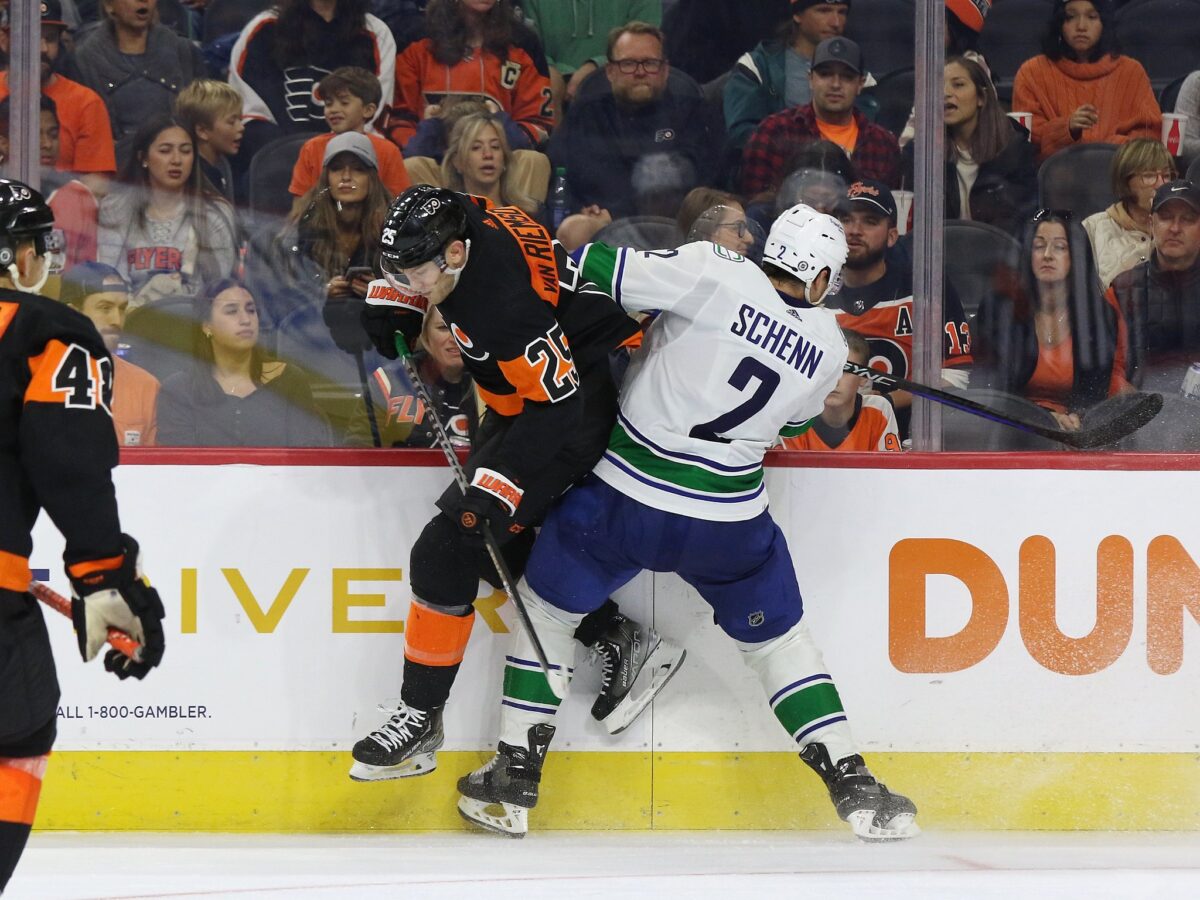Former Vancouver Canucks general manager (GM) Jim Benning still receives a lot of criticism for the decisions he made. Many of his draft picks, signings, and trades did not yield the level of success he envisioned. Although, rather than only pointing out the bad during his tenure, shedding some light on the good is also important. Specifically, looking at the free-agent signings he undoubtedly hit on. Benning had many duds, but amid the albatross contracts he handed out, there are also some tremendous ones. After reviewing the extensive list of free-agent signings, five names stick out as quality additions.
Radim Vrbata
Signing Radim Vrbata was one of the first major moves Benning pulled off as GM. He signed Vrbata to a two-year, $10 million contract in the 2014 offseason, and it was an immediate success. Vrbata scored a career-high in points during his first year with the Canucks, putting up 31 goals and 32 assists in 79 games. He immediately found chemistry with Daniel and Henrik Sedin, riding shotgun with the beloved twins for most of the season. He also added a needed spark to the offense, helping turn them into a playoff team in the 2014-15 season, scoring four points through six playoff games.
Related: Meet the New Canucks: Carson Soucy
Vrbata’s second season with the Canucks was a mess. In 2015-16, he only scored 27 points, including 13 goals. It was a massive disappointment from the previous year. He left the team at the end of the season and signed with the Arizona Coyotes, leaving the Canucks in his rearview mirror. He retired after the 2017-18 season, finishing his career with the Florida Panthers. Even if Vrbata’s second season was a complete failure, his career year in 2014-15 helped the Canucks make the 2015 Stanley Cup Playoffs, which warrants giving Benning some credit.
Troy Stecher
The Canucks signed Troy Stecher to a two-year, entry-level contract (ELC) with an average annual salary (AVV) of $925,000 in 2016. The Richmond native was a heart-warming, local signing for a team that needed a feel-good story. He signed in April amid a season of disappointment and misery for the Canucks. The undersized 5-foot-10 defenseman played for the University of North Dakota with Brock Boeser before joining the organization, showing flashes of top-four upside.
Throughout his tenure with the Canucks, Stecher was a consistent bottom-four defenseman capable of providing good two-way play. He scored 11 goals and 64 assists in 286 games over four seasons with the team. His greatest accomplishment was his game-winning goal in Game 1 of their 2020 first-round series against the St. Louis Blues.
Stecher eventually left in free agency, signing with the Detroit Red Wings in 2020. Despite letting him walk for nothing, Benning’s signing of a local, right-handed defenseman, who had a relationship with Boeser, is one of his best moves as Canucks GM, let alone free agent signings.
Thomas Vanek
Thomas Vanek only played 61 games in a Canucks uniform, but every second counted. Benning signed the veteran forward to a one-year, $2 million contract in September 2017. The winger was coming off a 48-point, 68-game season in 2015-16, splitting time between the Red Wings and Panthers. In retrospect, his low-cap hit is shocking. He scored 17 goals and 24 assists in 61 games with the Canucks and was lethal on the power play.
The Canucks traded Vanek to the Columbus Blue Jackets at the 2018 NHL Trade Deadline to the Columbus Blue Jackets. Despite his strong performance, the poorly constructed roster could not compete in the gauntlet that was the Western Conference. At the time of the trade, Vanek was tied for second in team scoring, and the team received veteran Jussi Jokinen and 22-year-old centre Tyler Motte. The Vanek trade showed good asset management on Benning’s part, while the signing proved to be a cheap, low-risk deal that paid dividends for the team.
Luke Schenn
The Canucks signed Luke Schenn to a two-year contract with an AVV of $850,000 when free agency opened in 2021. He was coming off back-to-back Stanley Cup Championships with the Tampa Bay Lightning, bringing championship pedigree to the team’s blue line. He was no stranger to the Canucks; the team first acquired him (and a 2020 seventh-round pick) from the Anaheim Ducks for Michael Del Zotto during the 2018-19 season. Following his short 18-game stint with the team, he signed with the Lightning and got a couple of rings.

Schenn added physicality and, surprisingly, offense to the Canucks’ defense. In 121 games over two seasons, he scored eight goals and 38 points. He was a regular on the blue line, stapling opponents to the boards while chipping in offensively. He was sent to the Toronto Maple Leafs at the 2023 NHL Trade Deadline for a 2023 third-round pick. While current GM Patrik Allvin traded him, it was Benning’s signing that allowed the Canucks to acquire an asset for Schenn, who proved to be much more valuable than his contract implied.
Alex Chiasson
Alex Chiasson is the last free agent Benning signed that provided good value. Initially brought in on a professional tryout before training camp in 2021, Chiasson impressed the team and earned a contract, signing a one-year deal worth $750,000. His offensive talent was a much-needed boost to the Canucks power play, and he scored 13 goals and 22 points in 67 games with the Canucks, showing he could still provide offense.

Chiasson sporadically played in the Canucks’ top-six in 2021-22, becoming linemates with Elias Pettersson at times. While his deployment speaks more to the Canucks’ depth than Chiasson’s role as a serviceable top-six forward, it is commendable that he played any role thrown at him. He may not be a flashy name, but 13 goals for $750,000 was superb.
Throughout Benning’s time with the Canucks, he religiously gave too much money and too much term to middle-of-the-lineup players, although he had a talent for identifying cheap, low-risk players and signing them for depth. If Benning had resisted handing out bloated contracts to players like Tyler Myers and Jay Beagle and focused on surrounding his stars with good, cheap options, he may still be employed. Regardless, the Canucks did not completely suffer with Benning as boss, as he flashed the potential to fill holes in his roster with low-cost talent at times.